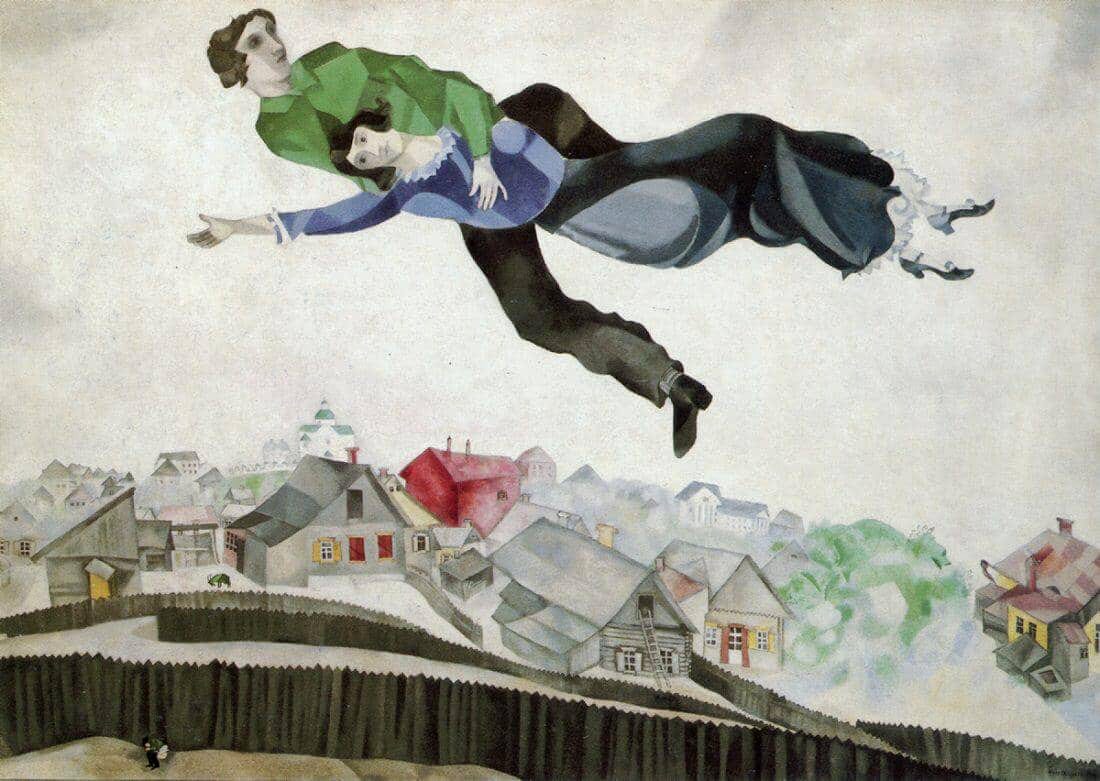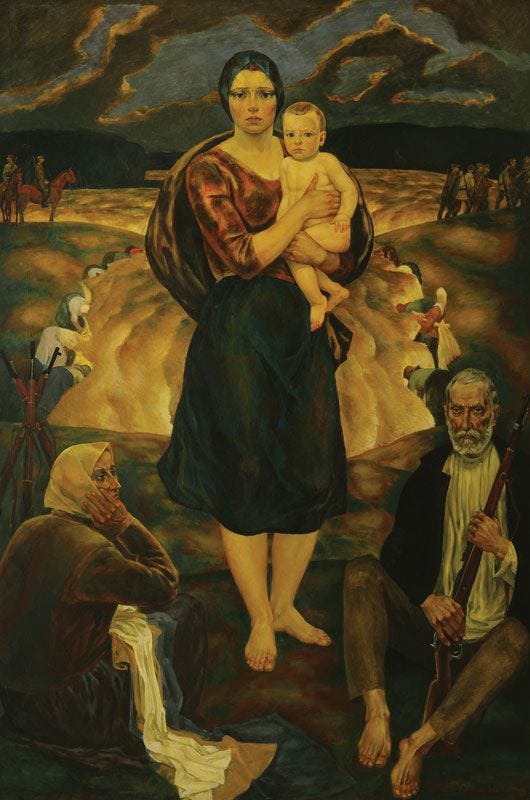Books and biases
A search for an art book for my husband’s cousin revealed how deeply rooted Russian colonialism is in the academic world.
This week, I was looking for a birthday gift for my husband’s cousin. She is graduating from high school this year and plans to study art history, so I decided to buy her a book about art. I went to the local bookstore, and while trying to find the art section, I saw a huge shelf dedicated to the history of Russia and a separate shelf with lots of books of Russian classics. I tried to find books by Ukrainian authors but didn’t see any. It made me uncomfortable, sad, and angry, as Russian colonialism was clearly dominating the space in that store. Of course, there weren't any books about my native Belarus either, as if it didn’t exist at all. I made my way to the back of the store, where I finally found a few shelves with books about art. Suddenly, I saw a book about Ukrainian culture, “Ukraine Rising,” edited by Lucia Bondar, in the corner of the bottom shelf. I haven’t read this book, but I felt like I met an old friend in a room full of strangers. I picked it up and placed it in the middle of the display with the most popular books in the store.
After that, I decided to search for art books online and ordered a copy of “What Great Paintings Say” by Rose-Marie and Rainer Hagen. The book had great reviews, and I thought I had found a perfect gift. The book included two Russian artists and, of course, zero Ukrainian ones, but I still decided to give it a chance. However, the description of the Russian paintings had obvious biases towards Russia, as the authors talked about great Russian culture and the poor, suffering Russians with whom they sympathized and tried to understand. I still hesitated, as the book had many other artists and paintings, but then I opened the page about Marc Chagall, an artist born in Belarus who dedicated many paintings to his native town, Vitebsk. The authors wrote that the artist was born in “provincial White Russia in the town near the former Lithuanian border” and didn’t mention the name Belarus even once. The book was published in 2022. I closed the book and wanted to throw it to the wall. Belarus is not a White Russia. Marc Chagall is not a Russian artist. Vitebsk is not “a town by the former Lithuanian border” but a town in Belarus. Belarus exists. I exist. These thoughts circled in my head while I was packing the book back into the box and applying for a refund.

I told my husband that I wouldn’t be able to study art history in college as I would argue with everyone and would eventually drop out. If everything that people study about Ukraine or Belarus is penetrated by Russian colonialism, no wonder they still sympathize with Russians and can’t believe that it’s not only Putin who is responsible for the war. No wonder people still think Ukrainians and Russians are brotherly nations and see no difference between Belarusians and Russians whatsoever. No wonder people believe that Ukraine and Belarus had no talented artists and writers if everyone was labeled as “Russian” all the time.
You just read one of many encounters that all of us, whose countries were colonized and cultures were appropriated by Russians, experience in our daily lives. I just wanted to buy a book for my husband’s cousin. Instead, I went through a whirlwind of emotions. I was reminded once again that if I stop speaking up and fighting this centuries-long battle against Russian colonialism and pro-Russian biases, my country will continue to be called White Russia, my artists and writers will continue to be labeled as Russians, and I will be considered a Russian writer/artist as well.
Check your local bookstores and see if you can find any books about Ukraine or Belarus that do not talk about these countries through Russian colonial lenses. See if you can find books about Ukraine and Belarus at all. Then, count how many books about Russia or by Russian authors you saw. Draw conclusions.
I decided to buy the collectible edition of Little Women by Louisa May Alcott instead of the art book for my husband’s cousin. If she chooses to study art history, she will face all those pro-Russian biases in the academic world, but at least my gift won’t remind her of them now.
Warmly,
Darya
Email: daryazorka@substack.com
Follow me on Instagram
Follow me on Twitter
Shop my art on Etsy
Watch the “20 Days in Mariupol” documentary
Watch Frontline PBS documentaries on Ukraine
Donate to help Ukraine: UKRAINE DONATION GUIDE 2024





I'm lucky that my local bookstore does carry some Ukrainian focused titles. That's how I discovered Professor Serhii Plokhy. Gates of Europe was on the shelf not long after the full scale invasion. I had no idea who he was but I loved the title and decided right then and there it would be my introductory book to Ukrainian history from a Ukrainian lens. I'm so glad I found him! I want to own everything he's written.
My bookstore also carries some of Timothy Snyder's work, including Bloodlands last time I looked. But there's nothing about Belarus that I ever remember seeing. There's not much Russian history or Russian classics either because this is the rural Deep South and people don't even know how to say Karamazov. But at the Barnes and Noble stores I visit in Baton Rouge and New Orleans, there's tons and tons of Russian history. The only Ukrainian stuff is about the war and it's not even the good books about the war. It's the ones by the Kremlin shills that I refuse to touch. Last fall I actually rearranged the shelf a little to hide one of them.
For every Russian classic I read, it'll be paired with a Ukrainian or Belarusian classic. Whichever I can get my hands on at the time. Because it matters that those books and authors are seen too and I want to be able to recommend them when I'm around people discussing Tolstoy.
Your "From My Heart" are always interesting. I know I am anachronism, both in terms in place and time. As I write, I can't but compare ruzzians as a nation of Heathcliff's from Wuthering Heights fame, and not the Byronic Hero portrayed in the movies but the sadistic psychopath that Emile Bronte meant to portray. And the illusion of greatness that ruzzia believe they are is just as narcistic as Catherine's threats to haunt Heathcliff from the grave until he joins in her suffering. Don't watch any movie about Wuthering Heights, but read the book to get the full flavor. The point is ruzzia for many has been portrayed, even at his worst via the popular media for such a long time as being nothing like it really has been that few people have really bother to look beyond what they have read or seen in movies. I'm personally ashamed, and worst yet I have been habituated to accept a level of leadership in our political leaders than what is needed. The recent picture of the UN President shaking hands with Lavrov is emblematic.
I completely agree with Llennihan that I hope yourself and Ukrainians and Belarusians continue to educate the world.